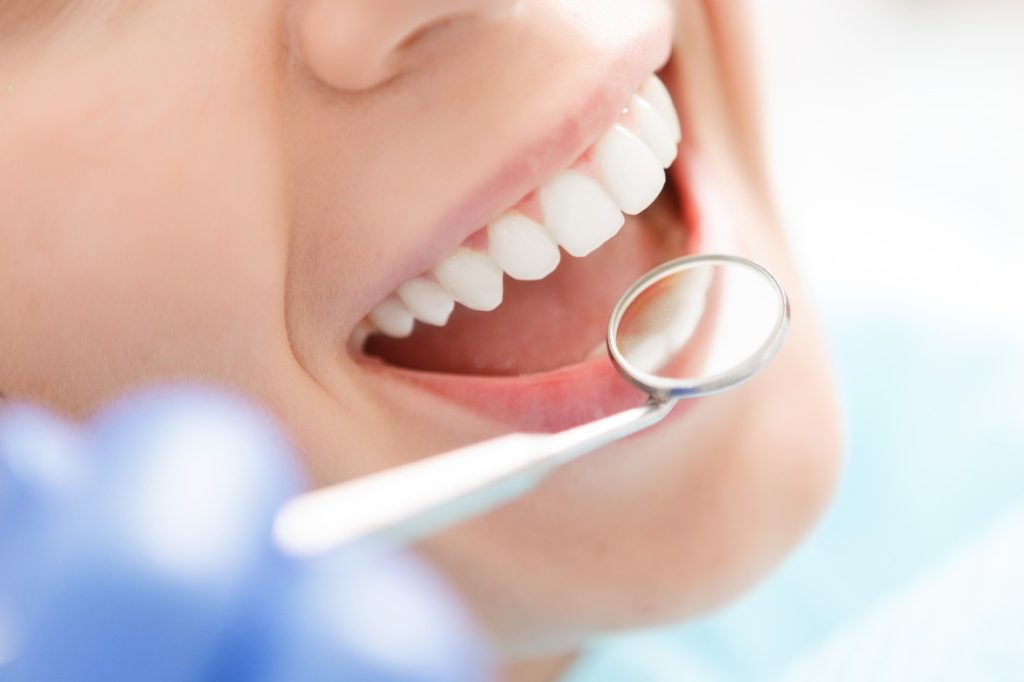Blogs
Reversible vs Irreversible gum disease, everything you need to know
We are all familiar with the general phrase gum disease and most adults in the UK have experienced it to some degree at least once – but what actually is it?
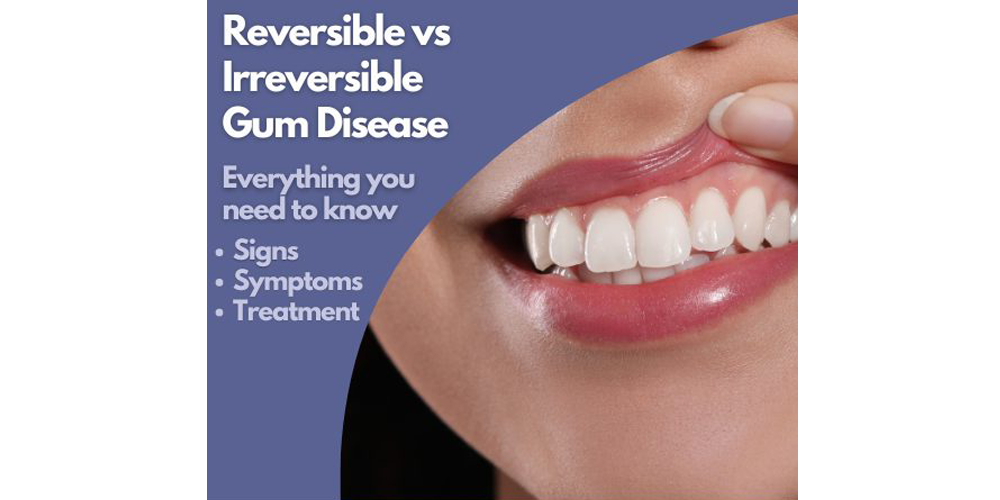
We are all familiar with the general phrase gum disease and most adults in the UK have experienced it to some degree at least once – but what actually is it? This blog by our Specialist Periodontist Puneet Patel explores the difference between reversible and irreversible versions of the disease and the treatment necessary for both.
What is gum disease?
Periodontal (gum) disease is the umbrella term for unhealthy gums. Several studies have shown the link between periodontal disease and general health conditions such as diabetes, heart disease and Alzheimer’s hence the importance of understanding the condition and seeking appropriate management.
Reversible vs irreversible gum disease
All types of gum disease can be categorised as reversible or irreversible.
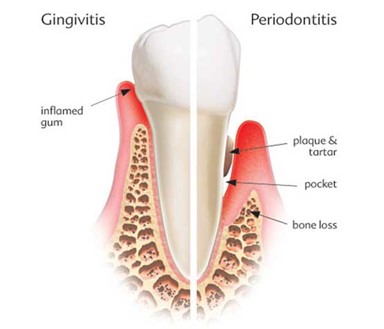
Reversible gum disease (Gingivitis) is usually, the early form of periodontal/gum disease and is characterised by red, swollen, and bleeding gums.
Irreversible gum disease (Periodontitis) is the latter form of periodontal/gum disease which requires more professional advice and intervention to manage. Although it may present with similar symptoms to gingivitis, it is more advanced and is characterised by deep pockets that form between teeth and the gum to allow a reservoir of bacteria to collect under the gum line where it cannot be easily reached for cleaning. Over time, periodontitis can irreversibly cause the loss of bone and gum responsible for holding teeth in place and is the primary cause for potential tooth loss.
What causes gum disease?
Periodontal (gum) disease is most commonly associated with plaque build-up around the gums over a sustained period. Other contributing factors include smoking, diabetes, genetics and stress.
What are the symptoms of gum disease?
There are several signs that indicate your gums may not be healthy, but it is also important to note that periodontal disease does not only come in one form. In fact, there are many stages of development that can appear the longer gum infections go without treatment.
The most common symptoms are:
- Inflamed gums (characterised by redness, swelling and bleeding)
- Loose teeth
- Bad breath
- Bad taste
- Gum recession (when the tissue around your teeth shrinks exposing more of the tooth and tooth’s roots)
Symptoms can also be more subtle which is why is important to have regular periodontal checks to identify any issues at as early a stage as possible.
How is Gingivitis (reversible gum disease) treated?
Gingivitis is characterised by red, swollen, and bleeding gums, in these cases, the inflammation can usually be reversed by a good oral hygiene regime and professional cleaning. This will keep plaque bacteria levels in the mouth to a minimum.
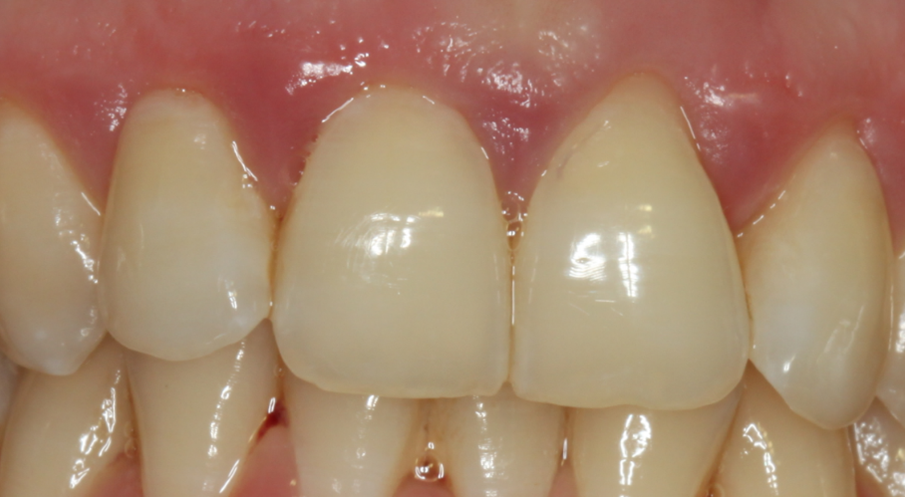
Gingivitis
Characterised by red, swollen gums
Three steps to a good oral hygiene regime
- Brush your teeth twice a day with fluoride toothpaste using a round headed oscillating electric toothbrush
After brushing, spit out any excess toothpaste. Don’t rinse your mouth immediately as it’ll wash away the concentrated fluoride in the remaining toothpaste and choose a different time of day to use mouthwash. After lunch is good as you can then avoid eating or drinking for 30 minutes to maximise results.
2. Clean between your teeth with interdental brushes or floss before you brush
3. Visit the hygienist regularly
Professional cleaning by a hygienist to remove hardened plaque deposits is also essential. At Devonshire House our team of hygienists work alongside our Specialist Periodontist Puneet Patel, to treat all stages of gum disease. They will provide you with a tailored care plan so you can continue your oral healthcare regime at home and will recommend the best products to clean in between your teeth according to your needs.
How Periodontitis (irreversible gum disease) is treated
Unlike gingivitis, periodontitis is not reversible but in the majority of cases with good management it can be controlled. Detection is based on a thorough examination of the gum tissues (inflammation and pocket measurements) and x-rays to assess the bone levels around the teeth.
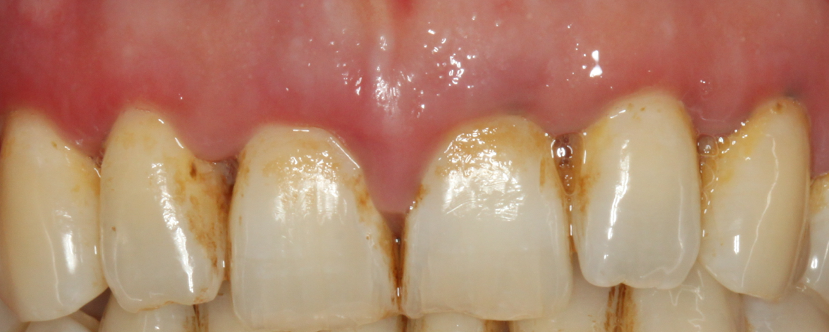
Periodontitis
additional characteristics are loss of gum and bone height
Procedures specifically intended to treat periodontitis include the following:
- Subgingival professional mechanical plaque removal (PMPR)– a form of deep cleaning that removes plaque and tartar from above and below the gum line
- Surgical PMPR – Gaining access to the roots so they can be cleaned with repair of bone defects with bone grafting materials in certain cases.
However, every patient’s gum status is different and will require an individually tailored approach to management.
Why do I need to see a Specialist Periodontist for treatment and not my dentist?
Periodontitis often requires specialist levels of care with more time and intervention needed. Our Devonshire House Specialist Periodontist Puneet Patel trained for 5 years beyond dental school, making him an expert in gum disease diagnosis and treatment. He is specifically trained to provide more complex treatments compared to a general dentist, especially for severe cases. If your dentist has referred you to see a Periodontist, don’t be alarmed—it may just be what you need to get your smile back on track! The goal of referral to a Periodontist is to stop the progression of gum disease and restore optimal oral health.
At Devonshire House our highly experienced Specialist Periodontist Puneet Patel specialises in the prevention, diagnosis and treatment of periodontal disease and treats patients with all stages of gum disease on a daily basis.
What to do if you are concerned about your gum health
The first step is to book a check up with a dentist. If you are not registered with a dental practice, Devonshire House can help. Our dentists Anthony Power and Richard Malloch welcome new private patients and will automatically assess your gum health in a routine check-up and if necessary, refer you to our Specialist Periodontist Puneet Patel for further care.
Alternatively, you can self-refer directly to Puneet for a specialist periodontal appointment if you have specific concerns about your gums.
Devonshire House dental practice – the private dental practice you’ve been looking for
As a growing practice Devonshire House in Cambridge welcomes new private patients. Whether you are looking for general dental care or specialist dental treatment, our award-winning practice and expert specialist dentists provide a full range of dental care and treatment for the entire family.
- Highly experienced Specialist dentists with a vast array of clinical experiences who are renowned leaders in their fields.
- Full range of specialist treatment with every treatment under one roof so you don’t need to be referred elsewhere.
- Same day emergency appointments.
- Beautiful and comfortable, relaxing surroundings with plenty of parking and great accessibility.
- Interest free payment options with a dedicated finance team to chat through your requirements.
- Treatment Co-ordinator to guide you through complex treatment and offer out of surgery support.
- Full suite of on-site scanning facilities for a quick diagnosis.
- On-site dental laboratory for emergency repairs.
- Out of town second practice if you’re looking to avoid the Cambridge traffic.
Read more blogs



